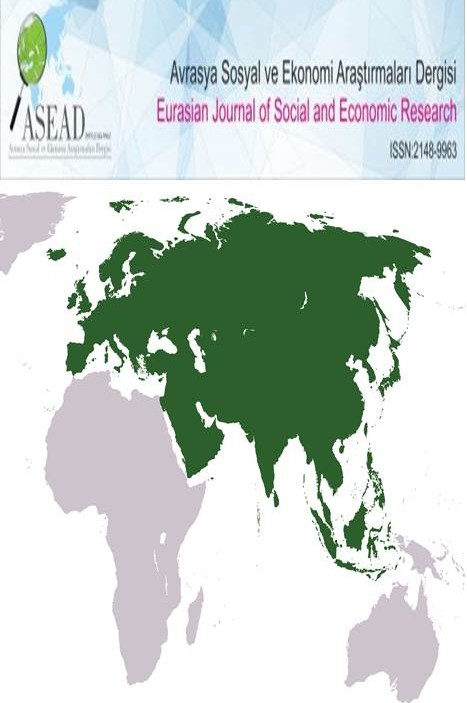GÜNÜMÜZDE İNSANIN DOĞAL VE SOSYAL HAYATINA YAŞAM MÜHENDİSLİĞİNİN ETKİLERİ ÜZERİNE BİR İNCELEME
beşerî, yaşam mühendisliği, teknoloji, yaşam kalitesi, etik
___
- ALT, R., Göldi, A., Österle, H., Portmann, E. and Spiekermann, S. (2021). Life Engineering. Business and Information Systems Engineering, 63(2), 191–205. https://doi.org/10.1007/s12599-020-00680-x.
- ANDERSON, K. (2021). Life Engineering: The good life as an engineered product. Axiomathes, 32(6), 1169–1187. https://doi.org/10.1007/s10516-021-09575-2.
- BAKER, D., Church, G., Collins, J., Endy, D., Jacobson, J., Weiss, R. (2006). Engineering life: building a fab for biology. Sci Am, 294(6), 44–51. https://doi.org/10.1038/scientificamerican0606-44.
- BEN-NOUN (NUN), L. (2021). The Role Of Humanity For Human Life. Ben Gurion University of the Negev Faculty of Health Sciences, Dept. of Family Medicine Beer-Sheva, Israel.
- BILLY, V. K. (2003). Discussion of the method: conducting the engineering approach to problem solving. Oxford University Press.
- BOWLING, N. A. (2014). Adaptation-Level theory. In Springer eBooks (pp. 28–29). https://doi.org/10.1007/978-94-007-0753-5_25.
- BRIAN, A. W. (2009). The Nature of Technology: What It Is and How It Evolves, Free Press, New York.
- BREYER, B., & Ruth, M. (2019). Social Engineering: Engineering of Societal Systems and Social Change. In Encyclopedia of Systems and Control (pp. 1-8). Springer.
- CAPPELEN, H. ve Plunkett, D. (2020). Introduction: A Guided Tour of Conceptual Engineering and Conceptual EthicsA Guided Tour of Conceptual Engineering and Conceptual Ethics. 10.1093/oso/9780198801856.003.0001.
- CARNAP, D., Van, D. (1990). The Quine-Carnap correspondence and related work: edited and with an introduction Richard Creath (Ed.). (University of California Press) http://ark.cdlib.org/ark:/13030/ft0c60030x.
- CEVHER, M. F. (2023). Bibliometric Analysis of The Internet of Things From A Marketing Perspective. Journal of Research in Business, 8(1), 153-170.
- COLLYER, F. (1999). The Social Production of Medical Technology, in Gribich, C. (Ed) Health in Australia: Sociological Concepts and Issues (Second Edition), Sydney: Longman.
- DARWIN, C. (1872 [1859]). The origin of species by means of natural selection (6th ed.). London: Murray.
- DAVIS, M. (2020). Social Support Systems for Vulnerable Populations: A Framework for Engineering Solutions. Journal of Social Engineering, 28(3), 245-259.
- DELEUZE, G. ve Guattari, F. (1991) What is Philosophy? (Columbia University Press).
- GOLDI, Andreas. (2020). A blind spot for the dark side: the monopolies we didn’t see coming. Electronic Markets. 30. 10.1007/s12525-020-00402-x.
- GREEN, S. (2021). Sustainability Engineering: A Comprehensive Approach to Balancing Nature and Society. Sustainability Science, 12(1), 89-104.
- HOBBS, J. R. (1985) Granularity. In: Proceedings of International Joint Conference on Artificial Intelligence, Los Angeles, 432–435.
- HOBBS, R. J., & Harris, J. A. (2001). Restoration Ecology: Repairing the Web of Life. Island Press.
- IEEE. (2018). Ethically aligned design: a vision for prioritizinghuman well-being with autonomous and intelligent systems. The IEEE Global Initiative on Ethics of Autonomous and Intelligent Systems, Version 2, New York. Available: https://standards.ieee. org/content/dam/ieee-standards/standards/web/documents/other/ ead_v2.pdf. Accessed 02 Jan 2020.
- ITO, J. (2019). Resisting reduction: designing our complex future with machines. MIT Press, Cambridge.
- JOHNSON, R. (2019). Equity and Justice in Social Engineering: Strategies for a Balanced Society. Journal of Social Equity, 42(2), 211-225.
- JONES, L. (2020). Environmental Impact Assessment: Identifying and Mitigating Human Activities. Environmental Impact Assessment Review, 25(4), 367-381.
- LEVI, A. W. (1959). The Value of Freedom: Mill’s Liberty (1859-1959). Ethics, 70(1), 37-46. http://www.jstor.org/stable/2379613.
- MARSCHALL, J., Hildebrandt, S. ve Nolting, H. D. (2019). Schwerpunktthema 2019: Alte und neue Suechte im Betrieb. In: Gesundheitsreport 2019-Analyse der Arbeitsunfähigkeitsdaten, pp.32–190. Hamburg, DAKGesundheit.
- MIZRAK, F. ve Cevher, M. F. (2023). The Impact of Social Marketing and Corporate Social Responsibility on Energy Savings as a Competitive Strategy. In Handbook of Research on Achieving Sustainable Development Goals With Sustainable Marketing (pp. 239-254). IGI Global.
- MERİÇ, B. (2004). Su kaynakları yönetimi ve Türkiye. Jeoloji Mühendisliği Dergisi, 28(1), 27- 38.
- MOU, B. (2021) “In Memoriam: Adam Morton (1945-2020),” Comparative Philosophy: Vol. 12: Iss. 1, Article 18.
- MURRAY, H. A. (1938). Explorations in Personality. New York; Oxford Univ. Press.
- OECD (2019). “Going Digital.” [Online]. Available: www.oecd.org/goingdigital/topics. Accessed 22 nisan 2019.
- OĞURLU, İ. (1995). Ormancılık ve Yaban Hayatı Koruma-Üretme Çalışmalarının Koordinasyonu Üzerine Bir Deneme, Karadeniz Ormancılık Kongresi, Trabzon, 1995.
- PORTMANN, E. (2021). Rezension: Life Engineering. HMD 58, 215–217 https://doi.org/10.1365/s40702-020-00674-z.
- OSTERLE, H. (2020a) Life Engineering – machine intelligence and quality of life. Springer, Cham. https://doi.org/10.1007/978-3- 030-31482-8.
- OSTERLE, H. (2020b). Life engineering. Electronic Markets, 30(1), 49-52. https://doi.org/10.1007/s12525-019-00388-1.
- SCHARP, K. (2018). ‘Philosophy as the study of defective concepts’, Conceptual Engineering and Conceptual Ethics. (Oxford University Press): 396–416.
- SCHWARTZ, B. ve Sharpe, K. (2010) Practical wisdom: the right way to do the right thing, (Penguin Publishing Group).
- SEISING, R. (2007). The fuzzification of systems. In Studies in fuzziness and soft computing. https://doi.org/10.1007/978-3-540-71795-9.
- SMITH, E. (2018). Engineering a Sustainable Tomorrow: Innovations for Environmental Harmony. Environmental Innovation and Technology, 14(3), 199-212.
- SMITH, J. (2022). Climate Engineering: Strategies for Mitigating Global Warming. Climate Change Research, 30(1), 45-58.
- WALKER, M. (2018). Education for Sustainable Development: Fostering Awareness and Action. Journal of Environmental Education, 32(4), 543-556.
- WESTCOTT, K., Loucks, J., Littmann, D., Wilson, P., Srivastava, S. ve Ciampa, D. (2019). Build it and they will embrace it. Deloitte Insights.
- WILSON, D. (2017). Ecological Restoration as a Tool for Biodiversity Conservation. Conservation Biology, 21(5), 1324-1332.
- ZUBOFF, S. (2019). The age of surveillance capitalism: the fight for a human future at the new frontier of power. Public Affairs, New York.
- Yayın Aralığı: Yılda 4 Sayı
- Başlangıç: 2014
- Yayıncı: İrfan TÜRKOĞLU
OSMANLIDAN GÜNÜMÜZE TÜRKİYE-HABEŞİSTAN İLİŞKİLERİNİN TARİHİ, SİYASİ, DİPLOMATİK VE ASKERÎ YÖNÜ
Rukiye AYDOĞAN, Tuba BAĞATARHAN
ORHAN PAMUK’UN KIRMIZI SAÇLI KADIN’INDA TRAGEDYANIN DOĞUŞU
SES SEMBOLİZMİ VE NESNE ALGISI İLİŞKİSİNE DAİR BİR İNCELEME
DOKUMA RESİM (TAPESTRY) SANATINDA MUSTAFA ASLIER ÖRNEĞİ
Tuncay PEKTAŞ, Mustafa YAŞAR, Tayyip CAN
TÜRKİYE’DE SOSYAL HİZMETLERİN TEMEL TAŞLARINDAN BİRİ: SOSYAL YARDIMLAŞMA VE DAYANIŞMA VAKIFLARI
EKONOMİK İSTİSMAR ÖLÇEĞİ’NİN TÜRKÇE GEÇERLİK VE GÜVENİRLİK ÇALIŞMASI
Erdinç KALAYCI, Ayşe Sezen SERPEN, Hasan Fehmi ÖZDEMİR, Veli DUYAN
GÜNÜMÜZDE İNSANIN DOĞAL VE SOSYAL HAYATINA YAŞAM MÜHENDİSLİĞİNİN ETKİLERİ ÜZERİNE BİR İNCELEME
HZ. PEYGAMBER’İN AMCASI ABBÂS B. ABDİLMUTTALİB’TEN NAKLEDİLEN RİVAYETLER
